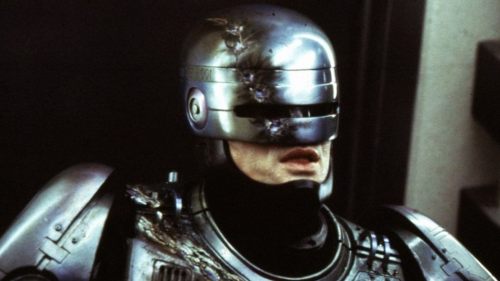Women Are Made For Tennis: The Goofy Joys of LADY BATTLE COP
Get your tickets to Drafthouse's RoboCop Movie Party with Livestream Q&A here!
If you spend enough time wallowing in trash cinema, you’re eventually going to stumble upon remakes of your favorite American pictures, shoddily produced by other countries. Lo-fi ridiculousness like Turkish Star Wars (’82)and WOH (’98) (the Indian adaptation of Stephen King's IT, which Sid just graciously covered) are frequently the end result – American staples distorted and entirely lost in translation, while simultaneously becoming their own brand of outrageous fun. Often, these productions are chores to sit through, offering little more than brief insights into another land’s pop idiosyncrasies. Sometimes, these riffs produce legitimate face-melters like Lady Terminator ('89), an Indonesian redux of the Cameron/Arnold sci-fi classic, which substitutes an Uzi-wielding, body-hopping vengeful sea goddess for time traveling robots from the future. Lady Terminator’s a hoot; as relentlessly violent as it is narratively incoherent, showcasing everything from bloody bullet showers to grotesque ghouls firing laser beams from their hollow eye sockets.
Akihisa Okamoto's Lady Battle Cop ('90) – the Japanese answer to Paul Verhoeven's Robocop ('87) – sits somewhere between morbid curiosity and life-changing farcicality, and would be an excellent B-Picture if you were ever programming a double bill with Lady Terminator. Set in Neo Tokyo (Japan's answer to Delta City), a tennis champion (Azusa Nakamura) who comes complete with her own rock theme song (which informs us "women are made for tennis") becomes the titular robotic death dealer following an attack by the local cartels. Turns out, these terrorists aren't too keen on the racket pro’s boyfriend (Yuki Kitazume) creating a new super cop with the sole intent of wiping their organization from the face of Japan. So they go apeshit, kill everyone in sight, and torch the scientist's lab. Truth be told, the plot is closer to Sam Raimi's Darkman ('90) than anything Verhoeven produced, Okamoto’s picture transmuting into a straight up revenge yarn. As the facility burns around them, our girl offers up her body as a donation, and with his dying act, the mad genius transforms her into Lady Battle Cop! Sadly, it's never answered as to whether or not this new peacekeeping cyborg can still rock a grass or clay court.
Thankfully, Lady Battle Cop's adversaries are almost as colorful as Clarence Boddicker and his coke-sniffing Delta City crew. Major Phantom (Masashi Ishibashi, from Sonny Chiba's The Street Fighter ['74]) never removes his uniform (even though Lady Battle Cop can do that and shower) as he commands a motley crew of bazooka-toting baddies, all hell bent on nuking her into oblivion. Best of all is a hulking, psychic mutant the cartel helps create, who is able to levitate and toss steel beams with his mind. The showdowns between these two freaks of science are exceedingly amusing, as the narrative of Robocop is simply simmered down to almost eighty minutes of non-stop action, with some police melodrama tossed in for good measure. Unfortunately, the gore and sadistic violence of Verhoeven's apocalyptic masterpiece is gone, replaced with a PG-13 musical episode of a Japanese "suited hero" TV show, but we take what we can get in this nonsensical rip off arena.
Speaking of music, the sax/metal soundtrack that drives Lady Battle Cop acts like some sort of demented jukebox Greek chorus and becomes overwhelmingly funny at times. Besides extolling the virtues of female tennis players, songs will drop in and narrate the proceedings as they occur onscreen, cluing us into the emotional workings of this cybernetic law enforcement agent. Without this element, Lady Battle Cop wouldn't be half as hilarious as it is, the OST worthy of consideration as one of the greatest pieces of accidental comedy ever crafted. But the tunes also serve as a playful glimpse into what was required to render Verhoeven's immortal classic palatable for its intended Japanese youth demographic. "I traded in my dress for a suit of armor," the singer yowls over wailing guitars, bringing an oddly empowering undertone to this otherwise silly vengeance tale.
Lady Battle Cop isn’t readily available in the United States (outside of tattered VHS copies you might be lucky and locate at a flea market), which is a shame. It’s a movie crying out for a devoted cult following, as it’s good natured action never tiptoes over the line into the wanton, satirical cruelty Verhoeven was such a master of. This actually marks Okamoto’s futuristic action cheapie as a pleasant inversion of the work it’s copying, and therefore an outlier in rip off cinema culture. Very rarely can a movie so blatantly ape another while manufacturing a unique tone of its own, but Lady Battle Cop opts to deliver fist-pumping, double-barreled joy instead of slyly cynical fantasy. The only thing that’s really missing is counterfeit commercials for faux Japanese products (though the film does intersperse mock news broadcasts), tipping this preposterous lost superhero origin story over into transcendent pleasure. “The battle is just beginning,” a last legend tells us, and the world is worse off for not having twenty Lady Battle Cop titles to choose from.
Don't miss out on Drafthouse's RoboCop Movie Party with Livestream Q&A. Get your tickets here!



